Culturally Appropriate Care: Connection to Country and Health Outcomes
VerifiedAdded on 2023/06/04
|6
|511
|404
Report
AI Summary
This report examines the concept of 'Connection to Country' and its crucial role in providing culturally appropriate care to Aboriginal communities. 'Connection to Country' signifies the deep love and respect Aboriginal people hold for their land, along with their extensive knowledge of its resou...

Connection to
Country
PROVIDING CULTURALLY APPROPRIATE CARE
Country
PROVIDING CULTURALLY APPROPRIATE CARE
Paraphrase This Document
Need a fresh take? Get an instant paraphrase of this document with our AI Paraphraser
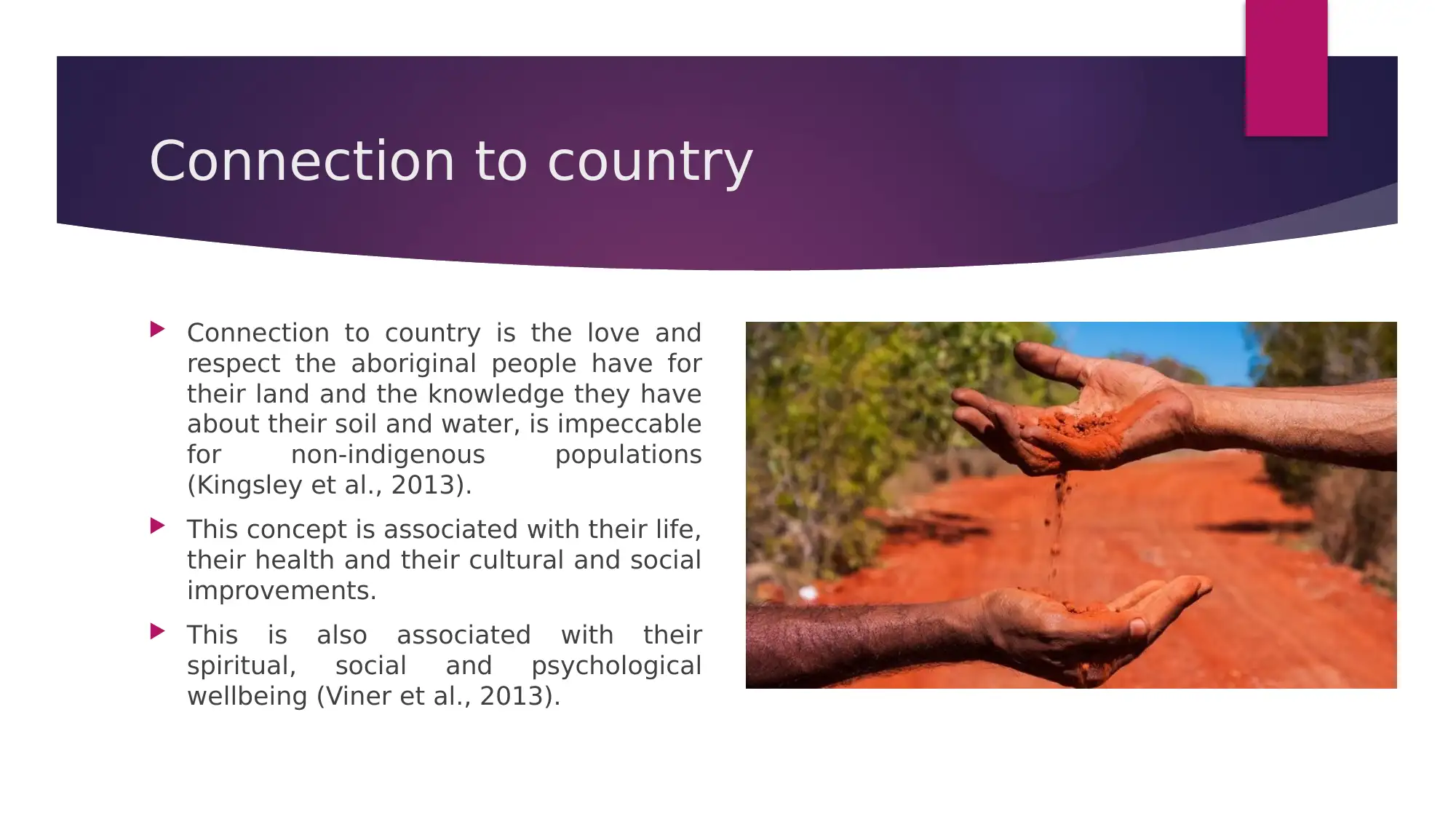
Connection to country
Connection to country is the love and
respect the aboriginal people have for
their land and the knowledge they have
about their soil and water, is impeccable
for non-indigenous populations
(Kingsley et al., 2013).
This concept is associated with their life,
their health and their cultural and social
improvements.
This is also associated with their
spiritual, social and psychological
wellbeing (Viner et al., 2013).
Connection to country is the love and
respect the aboriginal people have for
their land and the knowledge they have
about their soil and water, is impeccable
for non-indigenous populations
(Kingsley et al., 2013).
This concept is associated with their life,
their health and their cultural and social
improvements.
This is also associated with their
spiritual, social and psychological
wellbeing (Viner et al., 2013).
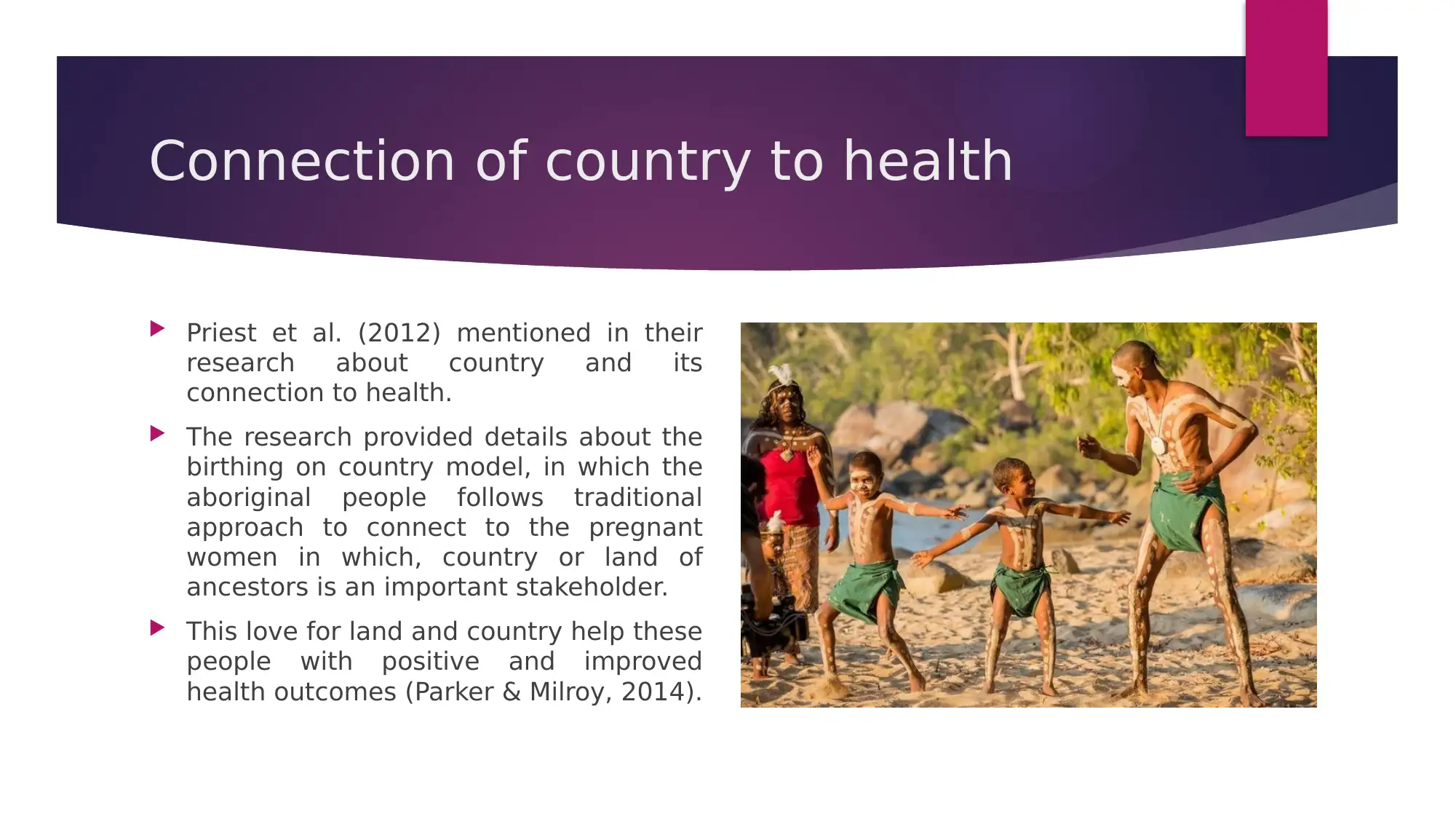
Connection of country to health
Priest et al. (2012) mentioned in their
research about country and its
connection to health.
The research provided details about the
birthing on country model, in which the
aboriginal people follows traditional
approach to connect to the pregnant
women in which, country or land of
ancestors is an important stakeholder.
This love for land and country help these
people with positive and improved
health outcomes (Parker & Milroy, 2014).
Priest et al. (2012) mentioned in their
research about country and its
connection to health.
The research provided details about the
birthing on country model, in which the
aboriginal people follows traditional
approach to connect to the pregnant
women in which, country or land of
ancestors is an important stakeholder.
This love for land and country help these
people with positive and improved
health outcomes (Parker & Milroy, 2014).
⊘ This is a preview!⊘
Do you want full access?
Subscribe today to unlock all pages.

Trusted by 1+ million students worldwide
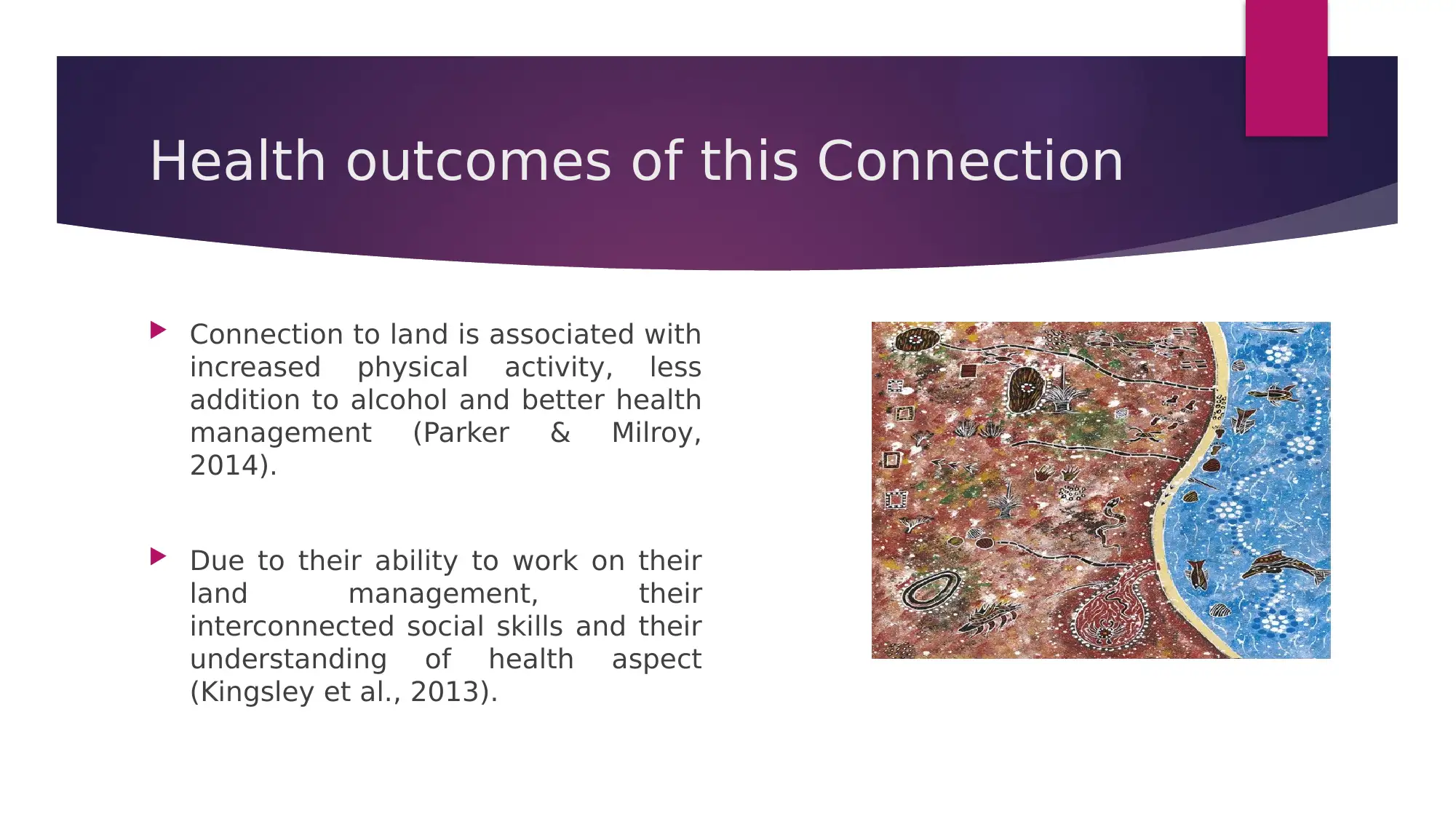
Health outcomes of this Connection
Connection to land is associated with
increased physical activity, less
addition to alcohol and better health
management (Parker & Milroy,
2014).
Due to their ability to work on their
land management, their
interconnected social skills and their
understanding of health aspect
(Kingsley et al., 2013).
Connection to land is associated with
increased physical activity, less
addition to alcohol and better health
management (Parker & Milroy,
2014).
Due to their ability to work on their
land management, their
interconnected social skills and their
understanding of health aspect
(Kingsley et al., 2013).
Paraphrase This Document
Need a fresh take? Get an instant paraphrase of this document with our AI Paraphraser
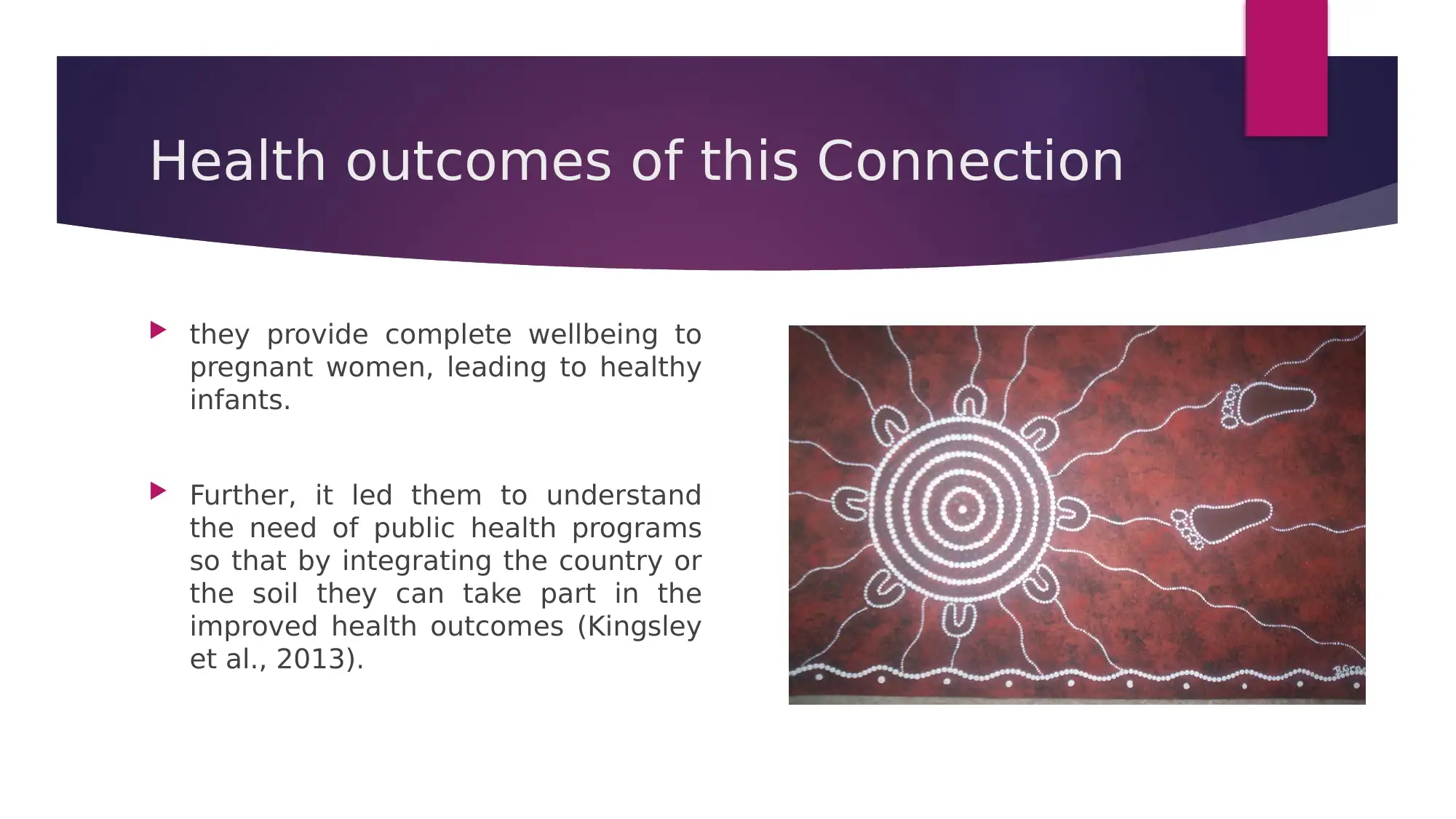
Health outcomes of this Connection
they provide complete wellbeing to
pregnant women, leading to healthy
infants.
Further, it led them to understand
the need of public health programs
so that by integrating the country or
the soil they can take part in the
improved health outcomes (Kingsley
et al., 2013).
they provide complete wellbeing to
pregnant women, leading to healthy
infants.
Further, it led them to understand
the need of public health programs
so that by integrating the country or
the soil they can take part in the
improved health outcomes (Kingsley
et al., 2013).
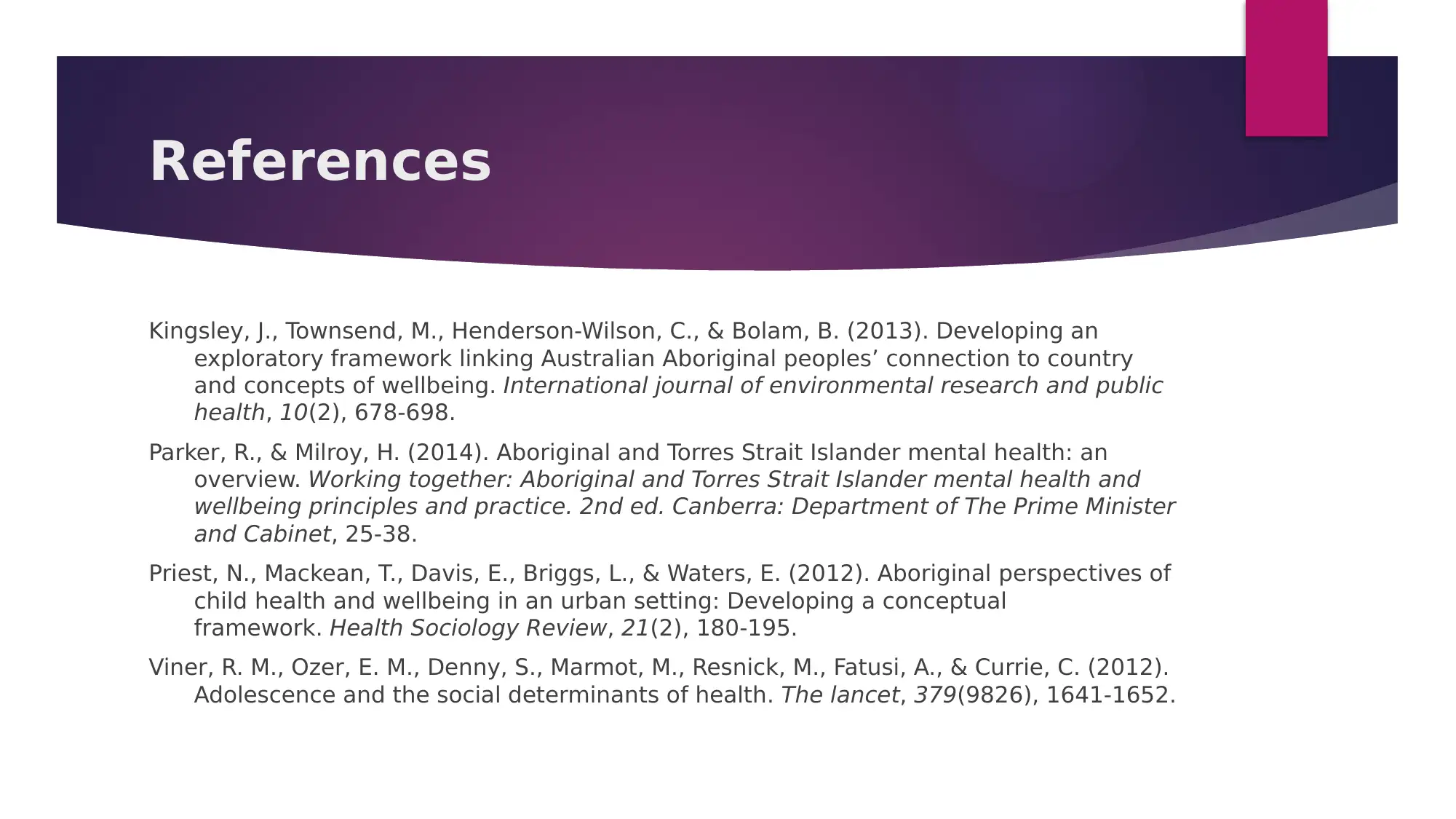
References
Kingsley, J., Townsend, M., Henderson-Wilson, C., & Bolam, B. (2013). Developing an
exploratory framework linking Australian Aboriginal peoples’ connection to country
and concepts of wellbeing. International journal of environmental research and public
health, 10(2), 678-698.
Parker, R., & Milroy, H. (2014). Aboriginal and Torres Strait Islander mental health: an
overview. Working together: Aboriginal and Torres Strait Islander mental health and
wellbeing principles and practice. 2nd ed. Canberra: Department of The Prime Minister
and Cabinet, 25-38.
Priest, N., Mackean, T., Davis, E., Briggs, L., & Waters, E. (2012). Aboriginal perspectives of
child health and wellbeing in an urban setting: Developing a conceptual
framework. Health Sociology Review, 21(2), 180-195.
Viner, R. M., Ozer, E. M., Denny, S., Marmot, M., Resnick, M., Fatusi, A., & Currie, C. (2012).
Adolescence and the social determinants of health. The lancet, 379(9826), 1641-1652.
Kingsley, J., Townsend, M., Henderson-Wilson, C., & Bolam, B. (2013). Developing an
exploratory framework linking Australian Aboriginal peoples’ connection to country
and concepts of wellbeing. International journal of environmental research and public
health, 10(2), 678-698.
Parker, R., & Milroy, H. (2014). Aboriginal and Torres Strait Islander mental health: an
overview. Working together: Aboriginal and Torres Strait Islander mental health and
wellbeing principles and practice. 2nd ed. Canberra: Department of The Prime Minister
and Cabinet, 25-38.
Priest, N., Mackean, T., Davis, E., Briggs, L., & Waters, E. (2012). Aboriginal perspectives of
child health and wellbeing in an urban setting: Developing a conceptual
framework. Health Sociology Review, 21(2), 180-195.
Viner, R. M., Ozer, E. M., Denny, S., Marmot, M., Resnick, M., Fatusi, A., & Currie, C. (2012).
Adolescence and the social determinants of health. The lancet, 379(9826), 1641-1652.
⊘ This is a preview!⊘
Do you want full access?
Subscribe today to unlock all pages.

Trusted by 1+ million students worldwide
1 out of 6
Related Documents
Your All-in-One AI-Powered Toolkit for Academic Success.
+13062052269
info@desklib.com
Available 24*7 on WhatsApp / Email
![[object Object]](/_next/static/media/star-bottom.7253800d.svg)
Unlock your academic potential
© 2024 | Zucol Services PVT LTD | All rights reserved.





